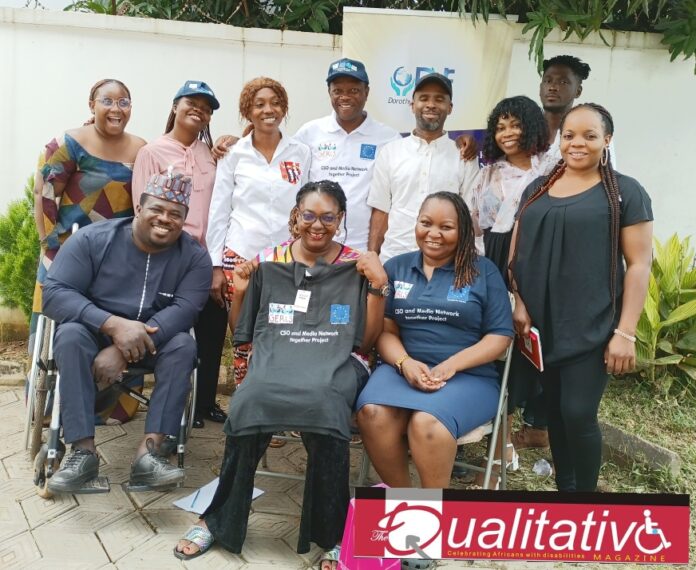A group of advocates as part of the activities of a microproject as part of the GERIS project funded by the European Union and implemented by Particip through Apolmida Haruna Tsammani (Haly Hope Foundation) and Zubairu Babajide Atta (Media Advocates for Peace) set to partner with Dorothy Njemanze Foundation (DNF) to address Sexual Gender Based Violence (SGBV) against women with disabilities.
This move was made during an advocacy visit of the group to DNF recently in Abuja.
Apolmida Haruna Tsammani said that the visit is to tap into what DNF is ready doing in Sexual and Reproductive Health Rights of Women and Girls especially on the area of SGBV.
“The essence of the project is to bring to the front burner issues affecting women and girls with disabilities especially Sexual and Reproductive Health Rights”.
She informed that government has formulated National Policy on Sexual and Reproductive Health Rights of Persons with disabilities with emphasis on women and girls which if it is fully implemented, it will assure the rights of women with disabilities to health care services among others.
She commended DNF for what they are in the lives of women and girls including those with disabilities with the shelter, where in spite of the challenges, DNF through the Shelter have restore hope and aspiration of women and girls who suffered Gender Based Violence.
She said that the group wished the work with DNF because of the desire of the group to create a viable referral channel for women and girls with disabilities because they have seen that not knowing where to go where they are violated has been one the biggest challenge facing women with disabilities.
Agbo Christian Obiora, the Executive Director of The Qualitative Magazine and member of the group commended DNF for job well done and said that they are venturing in an area where not much attention has been given. He also said that SGBV is also one of the causes of disabilities because when these girls are violated, no one cares to know how it has affected their mental state. Many cases have degenerated into mental health disability and many girls who are in this category still out there not attended to.
Zubairu Babajide Atta said that synergy among the media and CSOs will go a long way towards addressing very many of these issues. He said that the issues should be in the front burner especially at the media so that it will get the necessary attention from the government. He said that one of the intention of the group through the GERIS project is to create a helpline for SRHR and DNF should be at the forefront driving it because the referral network would have organization like DNF to enhance the essence of the helpline.
Dorothy Njemanze, the founder of DNF, in her response gave some background of DNF and the shelter that it is operating. She said that they started from a small office and shelter but today, the story is different.
“We got a partner who paid for bigger office and shelter that we are in now”.
She lamented about the frustrations they get in working out litigations to get justice for the victims, from families, the police, and attacks from perpetuators.
Again, she explained that funding is their greatest challenges because in supporting a victim, you are also bankrolling the experience because in most cases, the victims do not have money to pursue their cases. Lack of funding have affected us in get the system to do what is expected of them in order to get justice for the victims.
She lamented lack of effort from the part of government towards supporting the shelter because through the shelter, DNF is completing the efforts of the government.
She offered to work with group to serve as one of the referral base and also offered to create awareness about the helpline so that issues of GBV would be reported as when due.
TQM learnt that the partners would be working to ensure that women and girls with disabilities imbibe the culture of reporting the case of violence against them as well as knowing their rights especially Sexual and Reproductive Health Rights.


